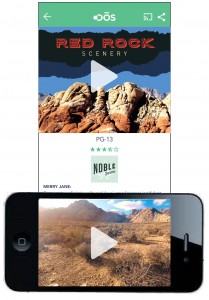Gerome Sapp is an ex-NFL football player looking to pivot from one green turf to another. In his latest venture, the Harvard Business School graduate has taken the helm as the founder and CEO of Dōs, a cannabis app aiming to be the self-described “Netflix for virtual experiences” when it comes to getting high.

“Unlike wine, first time users of cannabis or a particular cannabis strain, can’t taste their options,” Sapp explains. He sees Dōs as the solution to virtually experience, and even enhance, the effect of cannabis. “We are selling the mood a particular strain of cannabis typically has on users,” he says. Some of the apps moods include: relaxed, calm, energized, euphoric, and dreamy.
Scheduled to launch its beta version in the next two weeks, the athlete turned tech space businessman warns that it’s not an app that gets you high and they don’t want the virtual experience to mimic what it feels like to be high. Instead, Dōs would be the first app that allows users to experience a variety of “movie-like” experiences that developers imagine cannabis users would enjoy if consuming a certain strain of cannabis.

“It’s a much needed marketing tool for the multi-billion dollar industry”, says Sapp. With legislative restrictions on how and where legal cannabis companies can market their product, platforms like Facebook and other go-to outlets for marketing to the masses continue to deny many cannabusinesses paid advertising space. “Cannabis brands can sponsor these mimicking experiences, the same way they are able to sponsor charity events in the physical world, as a new way to market their products and to also serve as a point of purchase sales tool inside dispensaries,” according to Sapp.
In addition to the brand sponsored experiences, other business aspects include adding product placements within a virtual experience. For example, a person could be drinking a brand name sports drink in the video.
Sapp also hopes that his experiment in the tech space will help to lift the stigmas attached to cannabis and legitimize the plant. “Technology has funny way of making people look at things different,” he explains, “which in this case can possibly allow people the ability to see cannabis in a different way.”
There are already some apps like Leafly, a subsidiary of Privateer Holdings, that provides a searchable database of information linked to a strains looks, feel, taste, and touch. Leafly has user reviews and a pie chart of test data they call the “strain fingerprint” which includes the percentages of THC and CBD among other compounds found in the plant.

Sapp admits “the only ‘kinda’ similarity I see to Leafly’s search function is that users can search for 1) experience titles, 2) brand names, or 3) moods within the app to access the virtual experiences that correspond.” Unlike Leafly, Dōs users cannot search for a particular strain. Instead, the strain experiences available depends on brand sponsorships. Brands will have the ability to write info about their strain in the sponsor summary section of that particular experience.
Dōs says they plan to set itself apart with it’s heavy emphasis on video as a marketing tool for brands to evoke certain feelings and “articulate the value, uniqueness and more importantly, the physical affects of cannabis products”. As an example, Sapp told me to imagine watching the waves crash on Santa Monica Beach at sunset to mimic a calm and relaxed mood.
The strategy of attaching feelings to products is nothing new. Soda company juggernaut Coca Cola has made millions off it’s “open happiness” campaign that began in 2009. Now, Coca Cola has doubled down on the marketing strategy with their new concept “taste the feeling”. He acknowledges the potential of his targeted, digital strategy and sees it expanding to other industries in the future. “This scaling will happen as soon as we learn our efficiencies and learn from our inefficiencies in the cannabis space,” says Sapp.
In February, the entrepreneur was a subject of my story for The Marijuana Times titled, Taking Hits on and Off the Field: Players Call for NFL to Fund Cannabis Research. He gave me first-hand insight as to what it was like to be treated for injuries as a player in the NFL and the relief he finally found after using cannabis as treatment.
“When I (we) were in ‘it’ we didn’t really think there was any other remedy available to us,” he added, “the NFL has such strict guidelines on what we can and can’t put into our bodies, most players (including me) were a bit afraid to step outside the recommendations of team doctors/trainers in regards to pain management. And more importantly, we were all under the naive assumption that they had our best interest in mind. So a natural remedy wasn’t even thought about and the benefit of a natural remedy was never discussed or addressed. The response often was, “is it on the list of approved substances?” Sapp explained.
Former NFL player and founder of The Gridiron Cannabis Coalition, Kyle Turley was also interviewed for my story. After seeing Turley and Sapp’s common interests in the advancement of cannabis reform, I connected the two via email. Sapp says they continue to exchange emails and have found common ground within the cannabis world. For now, Sapp is focusing on a successful launch of his new app.
The transition from successful pro athlete to successful businessman is not easy, explains Sapp. Comparing his new venture to the life he left on the football field gives him a sense of comfort and a source of strength. “The new business literally becomes our team and running or leading the business becomes the substance that fills the void football left,” he says.

Overcoming the football player stereotype is another hurdle he is clearing with the launch of Dōs. “Even the most educated guys with the best career opportunities, we still aren’t sure how the world will now look at us without our helmets on, and more importantly, we aren’t sure who we are to this new world of not being a professional athlete. I call it an identity purgatory,” explains the former pro athlete.
He is not sitting on the sidelines when it comes to his company. Sapp even helped write the app’s algorithms. “Being able to successfully create a new tech concept feels like I scored the first Touchdown of long game. There is still tons of things to execute and there still needs to be a little luck, but I feel I’m on the right track to winning this new ‘game’ being played in the awesome tech world.”
According to Sapp, he is the only former or current NFL athlete to receive Venture Capital for an emerging media tech company. Tony Hsieh, CEO of zappos.com, led the round in that particular venture.






